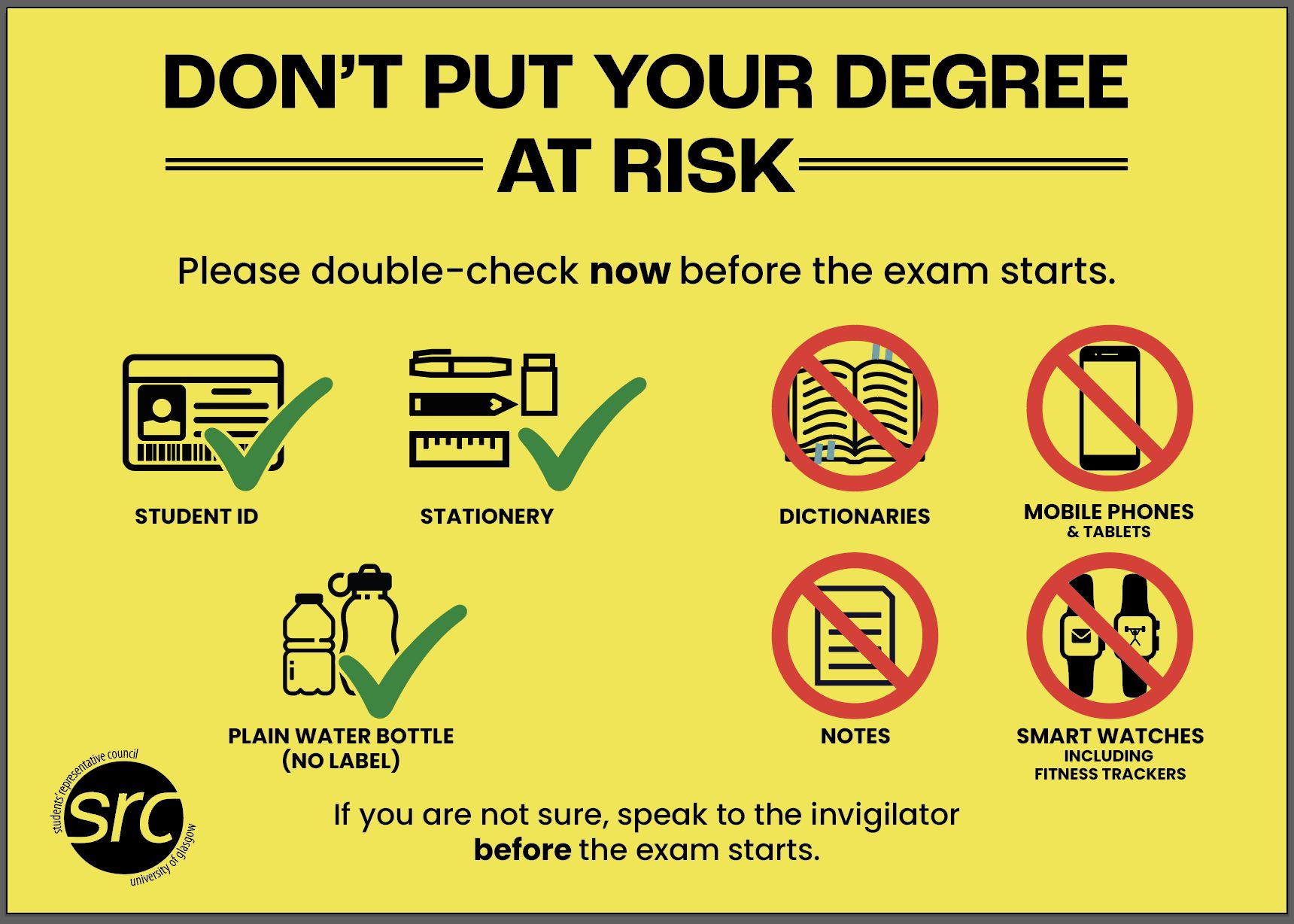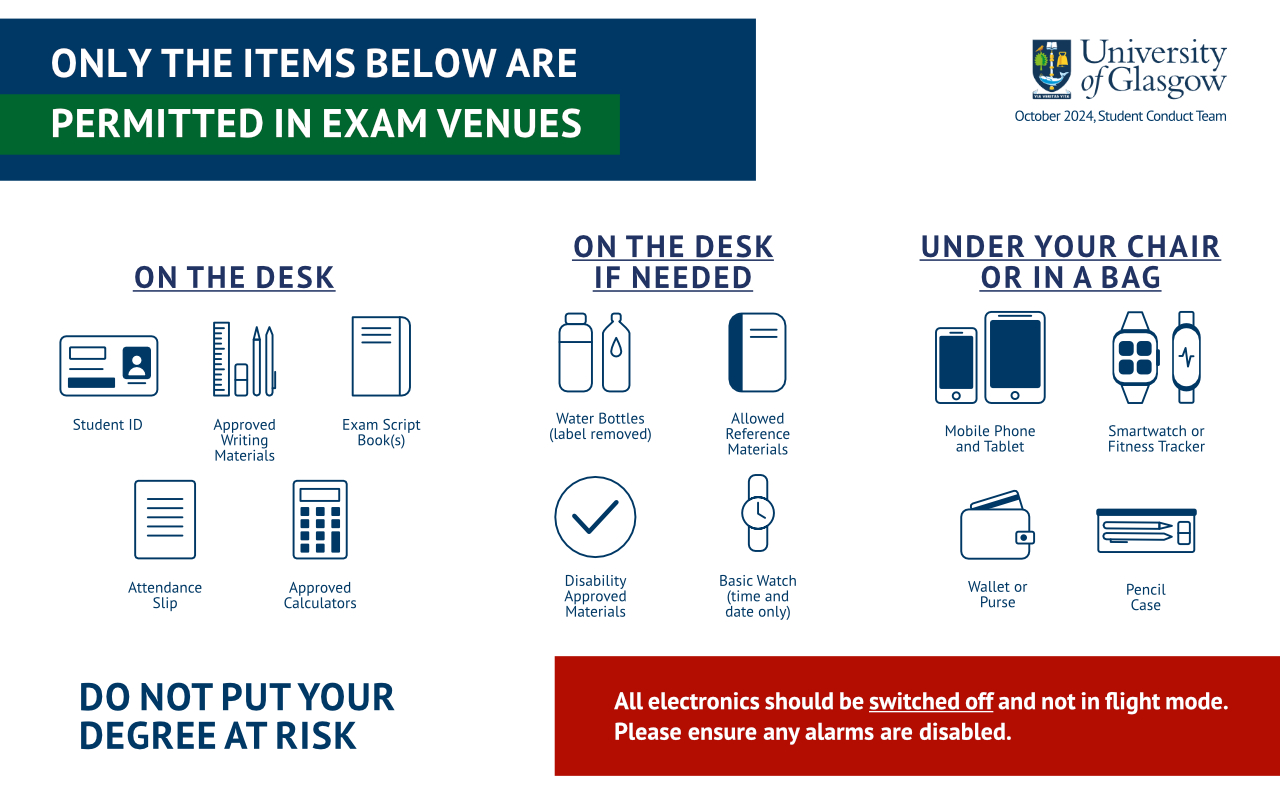Contents
- Exams stress or panic
- Support for Disabled Students
- Advice for in-person exams
- Advice for online exams
- Illness or other personal circumstances affecting exams
- Top tips for exams
Exam Stress or Panic
If you are panicking about exams or re-sits and don’t think you have prepared properly, don’t suffer in silence. Speak to a member of staff on your course to see if there is any last minute help they can give you with tricky topics. Try and practise past exam questions if you can.
If you have a medical condition which is made worse by exam stress, then speak to your GP or counsellor and see if there is anything they can suggest to help you cope. Make sure you notify your Head of School if you have a medical problem affecting your exam performance (see below).
Check out the University’s Exam Support webpages. The SRC and other student bodies also run events around exam time, aimed at supporting your wellbeing and helping you de-stress, so look out for these too.
It sounds obvious, but don’t be tempted to cheat your way through a difficult exam. It’s very likely you’ll be caught, and this will usually mean you won’t get any marks, and you won’t be allowed to re-sit. Depending on the way your programme is structured, this could mean leaving with no degree.
Support for Disabled Students
Disabled students have the right under the Equality Act 2010 to request that the University make what are referred to as "reasonable adjustments" to ensure they are not disadvantaged compared to their non-disabled peers. In practise this simply means that the University must offer additional support to disabled students to ensure their disability does not mean they are disadvantaged at any point during their studies, or whilst undertaking an exam.
Common reasonable adjustments they can offer for exams include:
- extra time at the start of an exam
- allowing a student to sit the exam in a separate room away from other students
- arranging a scribe to write the exam answers on a student's behalf
If you have a disability we would always encourage you to register with the University's Disability Service and they have advice on how to register with them, and how to request exam arrangements on their website here.
The University set deadlines in advance of each exam diet by which point a student must have registered with the Disability Service to request any reasonable adjustments for their upcoming exams. We would therefore encourage you to register with the Disability Service and arrange any reasonable adjustments for exams as early in the academic year as possible.
What to expect in the exam
Throughout your time at University you will likely be expected to sit both online and in-person exams. Please make sure you have read and understood any instructions from your School about how the exams will be run, whether they will be online or on-campus, and what you are and are not allowed to do during the exam.
Advice for in-person exams
The first thing to check for an in-person exam is that you know the exact time, date and location of the exam. Your School will email you details of this in advance and if you are not sure of the exact location of the exam venue you can use the University's room finder page to help locate it.
Along with the time, date and location of the exam your School will also email you confirming if there are any special arrangements for the exam, for example - if you are permitted to use a dictionary or a particular calculator etc.
The University has provided a digital version of the Exam Announcements that are made by invigilators at the start of every in-person exam. This can be accessed here and is helpful for understanding what you can expect when you are sitting your exam.
Prohibited Items for in-person exams

Please avoid taking any prohibited items into your examinations. If you are caught with a prohibited item in an exam, – even if you had it with you by accident – it will result in a penalty which could cost you your degree.
When entering the hall, please check carefully to ensure you have no revision notes or other materials on your person or in your pockets. This includes any notes written on your body or other objects, such as pencil cases or dictionaries.
You are not permitted to take a dictionary into an in-person exam with you.
You are not permitted to keep any electronic devices on your person during examinations. Electronic devices include:
- Mobile phones
- Tablets
- Smart watches
- Fitness trackers
- Music players
Watches - The exam venue should have a visible clock so you can keep track of the time but if you want to take in your own watch the University's regulations require that this is a "basic watch". This essentially means that it must not be a smartwatch or fitness tracker and only displays the date and time. It must not have the ability (whether set up to do so or not) to store, send or receive data of any kind, or to connect to a phone.
You cannot wear the basic watch on your wrist and must place this on the desk in front of you for the duration of the exam.
Calculators – if you are allowed to take a calculator to the exam, make sure your calculator is the permitted kind. Make sure there are no notes written on the calculator itself, and take it out of its calculator case before the exam.
Water Bottles — only clear plastic water bottles without any labels will be allowed into examination venues. Please ensure that you remove any labels from the bottles before you enter the examination hall.
Check the University’s Instructions to Candidates on Conduct in Written Examinations to make sure you know the rules.
The University' Student Conduct Team have created a handy visual reminder of what you can and cannot take into an in-person exam and where each item should be during the exam.

If you are caught with prohibited items in an exam, the invigilator will have to report this to the Senate Assessors for Student Conduct.
If you have any questions about what you can or cannot take into an in-person exam you should contact your Course Convenor or Adviser of Studies before the exam.
It’s stated above, but worth repeating – bringing prohibited items into an examination room by mistake is not usually accepted as an excuse by the University. Penalties can be imposed whether or not the material has actually been used during the examination. Please note this can put your degree at risk.
Advice for online exams
As with in-person exams, the first thing you should check for online exams is that you know the date, time and how to access the exam.
Your School will email you in advance confirming all of the above and also confirmation on if the exam will be a closed or open book exam.
Closed book in this context means that you cannot use any external sources other than what you've already memorised in the exam.
Open book in this context means that you will be permitted to use whatever external sources the School confirm to you. These may be your lecture notes, textbooks, websites or academic journals.
It is very important that you take note of whether the online exam is either a closer or open book exam as if you are found to have used external sources in a closed book exams it's likely you'll be accused of breaching the University's Code of Student Conduct which could result in you receiving zero marks for the exam.
If you haven't undertaken an online exam before, or you just want some practice to familiarise yourself with how the exam will look and the process you'll need to work through, the University have created a practice online exam Moodle you can enrol yourself on.
If you experience any technical or IT issues during an online exam it is vital that you contact the University's IT Helpdesk to report this. Even if the IT Helpdesk are unable to assist or resolve the issue for you, if you decide to submit a Good Cause claim for the exam the fact that you have a record of contacting them could be vital evidence to support your claim.
Remember to leave yourself enough time at the end of the online exam to upload your exam submission. The University can be very strict on accepting any submissions that are received after the exam time has ended and you can refer to the University Online Exam and Late Submission Policy here
Illness, or other personal circumstances affecting your exam
You must submit a Good Cause claim if:
- You are going to be absent from an exam, or
- You have missed an exam, or
- You believe your performance in an exam has been affected by illness or adverse personal circumstances
and you want this to be taken into account.
A Good Cause application should be submitted within 5 working days of the date of the affected exam. Don’t wait until you get the results and then try and submit Good Cause.
You should inform your Head of School that you will be absent or that you believe your performance was affected. Please speak to a member of staff if you are at all uncertain whether your situation can be considered as Good Cause.
You will usually need to provide evidence of Good Cause – for example, a doctor’s note.
Please refer to our own advice page on Good Cause here.
See also University’s Absence Policy for Students and Good Cause FAQs for more guidance.
If you have any queries regarding the above information, please contact the SRC Advice Centre.
Good Luck!